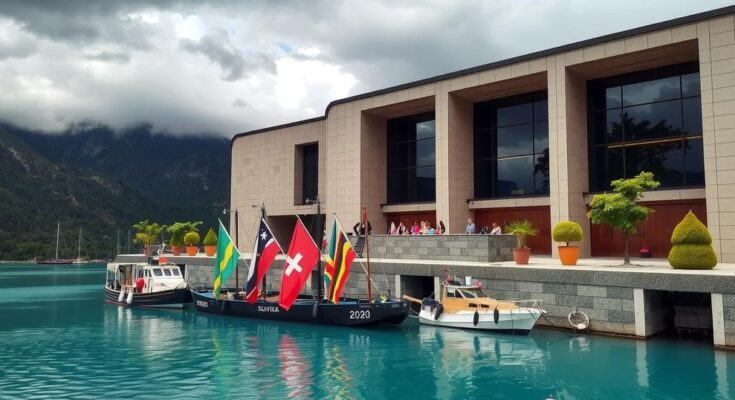Slovenia has presented its case before the International Court of Justice regarding the obligations of states in addressing climate change, emphasizing the human right to a clean environment. The proceedings involve unprecedented participation from 98 states and 12 organizations, focusing on international cooperation and proactive measures to combat climate challenges, reaffirming Slovenia’s advocacy for such rights at the UN.
Slovenia presented its case before the International Court of Justice (ICJ) regarding state obligations pertaining to climate change. This case arose from a request by the UN General Assembly through Resolution 76/300, with Slovenia backing the initiative. In a historic proceeding that saw participation from 98 states and 12 international organizations, Slovenia emphasized the intrinsic link between the right to a clean, healthy, and sustainable environment and the realization of fundamental human rights such as life and health. The Court, ahead of the hearing, consulted the Intergovernmental Panel on Climate Change (IPCC) for scientific data, reinforcing the weight of the discussion at hand.
For years, Slovenia has been a strong advocate for recognizing and protecting the human right to a clean, healthy, and sustainable environment on the global stage. The right was reaffirmed in 2021 by a resolution of the UN Human Rights Council, supported by Slovenia and allies including Costa Rica, Morocco, the Maldives, and Switzerland, and again in 2022 by the UN General Assembly. During the ICJ proceedings, Slovenia reiterated the urgency of combating climate change, highlighting the necessity of proactive measures by states to uphold individual rights, especially the right to a safe environment.
Moreover, Slovenia called for enhanced international collaboration to tackle the underlying causes of climate change effectively. The country framed the climate crisis not only as an environmental issue but also as a human rights crisis, advocating a comprehensive strategy that avoids emergency responses which could undermine human rights obligations. Slovenia asserted the importance of cooperative efforts, emphasizing that the safeguarding of individuals transcends national borders and relies on mutual diligence among states. Slovenia’s commitment is also reflected in initiatives such as the recently formed Global Alliance to Spare Water from Armed Conflicts.
Prime Minister Dr. Robert Golob reaffirmed Slovenia’s dedication to combating the root causes of climate change during his address at the UN General Assembly in September 2024, a commitment further discussed during a panel featuring Slovenian experts at a forum on the right to a healthy living environment, organized by President Dr. Nataša Pirc Musar at the end of September 2024. Recordings of the hearings can be accessed through the United Nations website, shedding light on this pivotal discussion.
The topic of climate change and its relation to human rights has gained momentum in international forums, particularly in discussions facilitated by the United Nations. The recognition of the right to a clean, healthy, and sustainable environment is increasingly being viewed as fundamental to the protection of other human rights. Slovenia has positioned itself as a leader in advocating these principles, participating actively in global discussions, and initiating resolutions within UN bodies. The engagement of the ICJ reflects ongoing global efforts to seek clarity on state responsibilities regarding climate change and the protection of human rights in light of it.
In conclusion, Slovenia’s engagement with the International Court of Justice signifies its commitment to establishing and reinforcing state obligations regarding climate change and its far-reaching implications for human rights. As a proponent of the human right to a clean and sustainable environment, Slovenia encourages international cooperation and proactive measures to mitigate climate impact. The ongoing discourse at the ICJ serves to elevate the global dialogue surrounding climate change, positioning it as a critical human rights issue in urgent need of joint action among nations.
Original Source: www.gov.si




